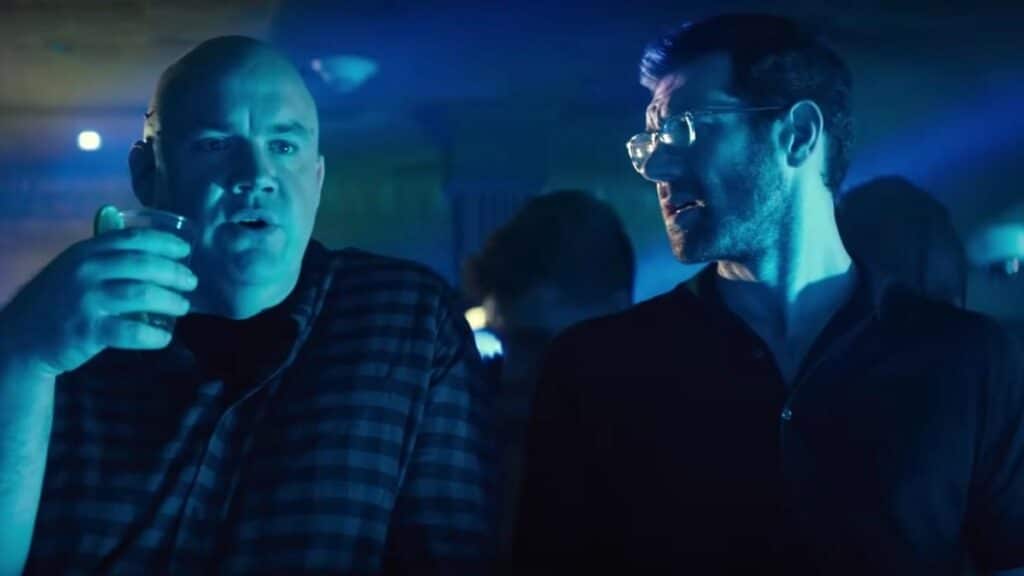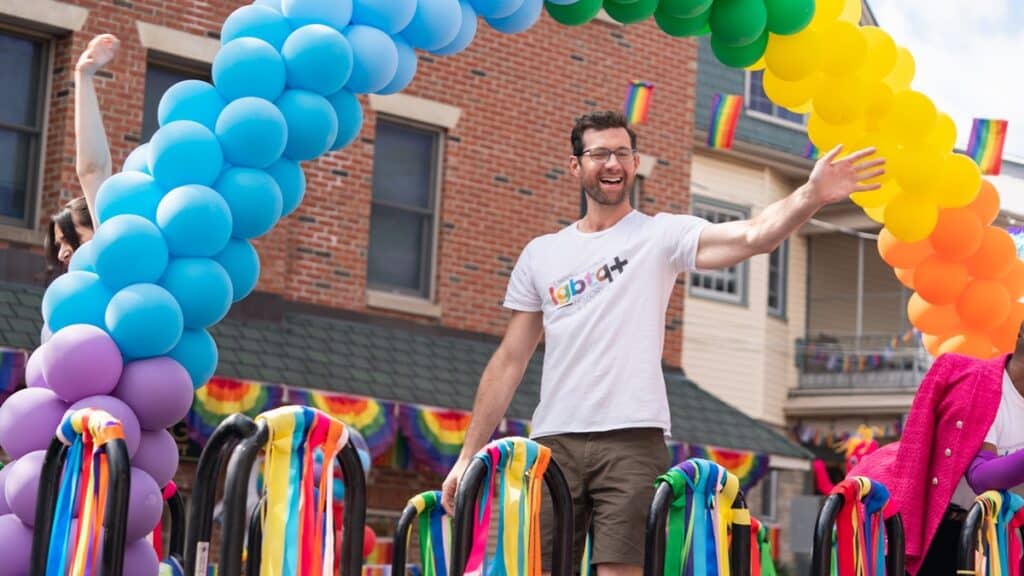Read also:
How to Watch FX Live Without CableHow To Watch AMC Without CableHow to Watch ABC Without CableHow to Watch Paramount Network Without CableThe groundbreaking queer rom-com delivers on both the “romantic” and the “comedy.”
Near the beginning of Bros, Bobby Lieber (Billy Eichner) meets with a Hollywood executive. The exec wants our protagonist to write a script for a gay rom-com. The executive is after something easy, a script that is palatable to straight audiences, a story about “nice gay guys.” Bobby, of course, isn’t having it. He tells the executive that gays have different stories than straight people before leaving, movie deal dead in the room.
The implication is clear. Bros is going to be a different kind of story, one that eschews heteronormativity and recontextualizes the romantic comedy for a queer lens. That’s a pretty tall order for a movie distributed by Universal and produced by the king of the bro-comedy himself, Judd Apatow. And while director Nicholas Stoller has made some pretty stellar comedies, he’s still a straight director known for making mainstream movies. Considering all that, could this really be the film to break the mold on queer stories made by Hollywood?
The answer, surprisingly, is yes. While Bros doesn’t hew as far from the rom-com formula as it thinks it does, it’s still a hysterically funny film that will resonate with gay audiences. While there’s plenty of material for straight audiences to enjoy, it’s an unapologetically queer film that delves into the nitty gritty of queer life.

Well, less “queer life” and more “upper class conventionally attractive white gay guys who live in New York life.” As I said, Bros doesn’t stray that far from the typical romantic comedy path. Yuppies in Manhattan is a time-honored rom-com tradition. Eichner plays Bobby, a podcaster and director for the Museum of LGBTQIA+ history, which has had several delays to its opening due to a lack of funding. Despite being single, he’s enjoying his life with his career and friends, satisfied with playing the field rather than settling down. However, meeting Aaron (Luke Macfarlane)—a very muscular, very masculine estate attorney—upends Bobby’s world.
Initially, their bond starts purely physical. Eventually, though, the pair admit their feelings for each other and start a relationship. However, tensions arise as Aaron’s conservative way of presenting himself bristles against Bobby’s more flamboyant personality. Bobby’s belief that Aaron doesn’t truly find him attractive due to him not being muscular only further adds to the strain.
The focus on Bobby’s body image issues is a refreshing perspective, not only for a mainstream movie but for queer movies in general. One of the biggest flaws of gay male society is its slavish devotion to body types, with many gay men refusing to date, sleep with, or even be friends with someone who doesn’t fit a certain aesthetic. Yet gay movies rarely discuss this issue while stocking casts mostly with muscle hunks or skinny twinks. Granted, Eichner being attractive does hinder the exploration of this issue, as does the fact that we see him sleep with muscular men before sleeping with Aaron. Still, it’s nice to watch a movie where the main character is just as insecure about his body as I am.
While Bros doesn’t hew as far from the rom-com formula as it thinks it does, it’s still a hysterically funny film that will resonate with gay audiences.
But while I appreciated the exploration of body politics within the gay community, it’s the humor that makes Bros. From the opening scene, the audience was howling with laughter, and I was one of the loudest in the theater. The trailers put a lot of focus on the humor of LGBTQIA+ history museum board members complaining among themselves about how no one acknowledges their specific letter in the alphabet mafia. This makes sense since woke infighting is an easy source of humor across the political spectrum. Thus, it also requires little context to be funny to all audiences.
It’s a shame because that scene is one of the weaker ones in the film. Bros really shines when it’s poking at the foibles of gay culture, whether it’s making fun of the abundance of hyperspecific apps (Bobby and Aaron meet at a party for the launch of a hookup app for queer cinephiles called “Zellweger”), bad TV Christmas movies trying to go “woke” (“Holly Poly Christmas” was my favorite), or the awkwardness of a creep trying to butt in on a threeway. Funny quips and set pieces certain to make anyone laugh abound in the script. However, they’ll prove particularly hilarious to those familiar with gay life.
The film’s fantastic cast bolsters the humor. Eichner manages the fine line of mixing a neurotic and acerbic personality with an underlying tenderness and insecurity that keeps him from becoming unlikeable. Macfarland starts as a Hallmark-Hot, somewhat bland romantic lead. Yet as time goes on, he reveals an additional tenderness that makes Aaron endearing. His chemistry with Eichner makes you want to root for these two to get together.

The supporting cast is similarly fabulous, if not a little crowded. Bobby has a lot of friends. While they are all great in their roles, it often feels like they’re trying to vie for attention. However, there are some standouts. Miss Lawrence plays Wanda, a member of the museum’s board, who never has any input of her own. Still, she’s sure to “see you, and make space for you” whenever you have a comment. Debra Messing also has a side-splitting scene where she complains about how gay men dump all their problems on her because they think she’s Grace.
Messing’s cameo is funny, but it’s also special because she’s one of the few straight actors on screen. Bros is the first mainstream film to have an all-queer principal cast. LGBT actors even author the straight characters—excepting celebrities playing themselves. It’s a welcome reversal to straight actors playing queer characters, and it helps Bros keep its authenticity.
Of course, authenticity is rarely all-encompassing. Most of Bros’ commentary centers on the gay-male experience, with little representation of the broader LGBT+ community. Still, it’s a decent step to better representation of queer characters, one I hope Hollywood will continue to push forward.
Bros starts making audiences laugh on September 30th in theatres.